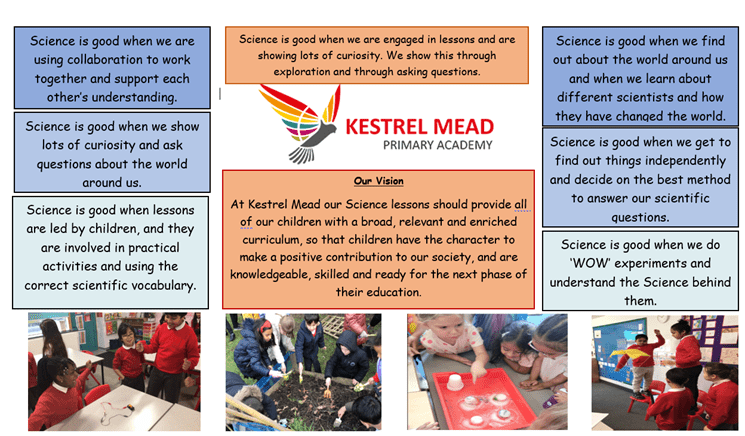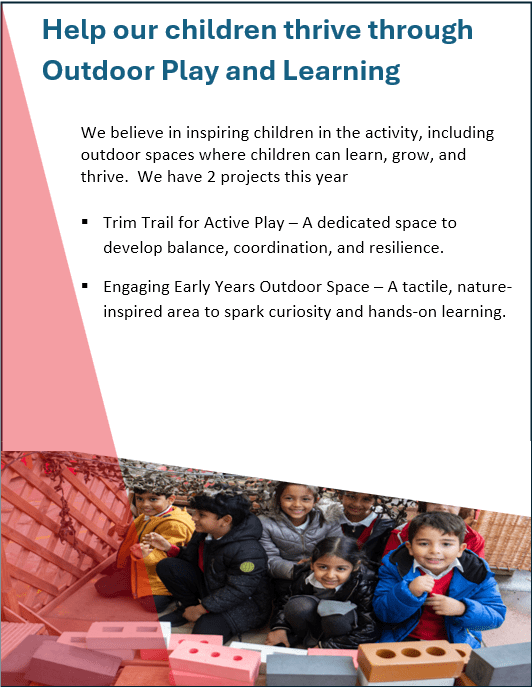At Kestrel Mead the Science curriculum is broad, relevant and enriched. Where possible Science topics are linked to the big questions in our sticky curriculum, we aim to link science to real life situations and adopting the five enquiry types within lessons. An enquiry-based approach is adopted across all year groups and children apply their Working Scientifically objectives throughout this approach. Examples of this can be seen in science floor books, children’s personal books and on the school Dojo feed. Our curriculum is designed to develop children’s curiosity using question based learning and practical lessons develop their resilience within science.
The science curriculum ensures that all children are provided with high expectations and encourages them to set themselves inspiring aspirations, as well as developing their confidence and ability to achieve this. Children will be provided with scaffolding and support as well as further challenge, as and when appropriate, ensuring their differing needs are met. The curriculum offers a ‘no ceilings’ approach, meaning that children are all accessing similar work. This allows children who are working at a range of levels in other subjects, to have opportunities to excel, foster their talents and develop their skills and knowledge. The science curriculum adopts an enquiry style approach, where children are encouraged to work collaboratively, allowing children to support each other, as well as working practically thus supporting all learners. Children are also challenged with a ‘Mr Stretch’ challenge, meaning that they have to apply their science knowledge to solve problems.
Each topic within the science curriculum includes a pre and post learning mind map, where children write their prior knowledge about the next topic in one colour and return to this in a different colour, adding their new learning. This forms part of the summative assessment as well as allowing teachers to see the knowledge that they are beginning with, allowing them to determine which children will need more support in terms of knowledge and understanding and which will need stretching further. At the end of each topic, teachers will carry out a focussed assessment, whereby all children complete a focused assessment piece for teachers to be able to assess their understanding. Teachers will also continue to use formative assessment to inform individual lessons.
Our Vision

What does Science look like at Kestrel Mead?
Science is designed to be fun and engaging, from EYFS to year 6! We like to do hands-on experiments, which spark our curiosity and ignite a passion and flare for science. Here at Kestrel Mead, we promote a zest for learning science, and children find the lessons fun and engaging. Where possible, we try to link our science learning to other areas of the curriculum. Our curriculum is designed to develop children’s curiosity using question-based learning and practical lessons to develop their resilience in science. We use the five scientific enquiry types in lessons.

Spotlight
Trips and Enrichments
Our Floorbooks
At Kestrel Mead Primary Academy, we use floor books, which are used in both KS1 and KS2. We use these to document the children’s learning, as a class. The children can take ownership of how they want it presented and can draw, write, and make things to stick in! There is one in every class, as the whole class can join in and share their ideas.
Science around the school…
Over the last year, we have been so fortunate to have some amazing things being built and painted onto our walls. At the infant building, we were lucky enough to have the National Space Centre and two female scientists painted onto the outside of the building. At the Juniors we have a whole corridor display dedicated to science and STEM. In addition to these amazing corridor displays, we have also had a whole new room built, which is amazing!! It is called the curiosity zone, and it is where children can go and have science lessons. It is called the curiosity zone, to do exactly what it says, to spark children’s curiosity! It is filled with new resources and books.
Useful Websites
Explorify
The Ogden Trust: resources
Curriculum Visions safe school learning platform.
Science – BBC Bitesize
Science Primary Resources | National Geographic Kids (natgeokids.com)
https://fizzpopscience.co.uk/primary-science-workshops-ages-5-12/
www.reachoutreporter.com/
www.schoolscience.co.uk/primary
https://www.bbc.co.uk/teach/terrific-scientific
Subject Champion/s
Miss K Jethwa & Miss S james
Subject Leader/s
Miss N Hall






























